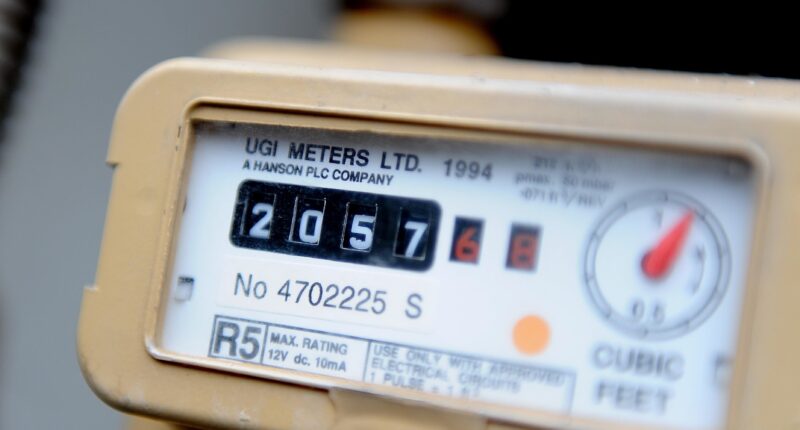MILLIONS of billpayers must take a meter reading NOW ahead of April’s price hike.
The government’s Energy Price Guarantee (EPG) promises to keep average bills at £2,500 a year.
It was extended until July in chancellor Jeremy Hunt’s Budget.
But millions of households are still set to see change to energy bills in April.
Energy standing charges rise, at the same time as vital government support for bills is withdrawn.
The overall result is that many will see an unwelcome and expected jump in costs – and it could be the most vulnerable households that are worst hit, energy charities say.


To make sure nothing goes amiss, households should consider taking a meter reading today.
This is so you know where you stand in case anything happens later down the line.
Ben Gallizzi, energy expert at Uswitch, said: “It’s worth remembering that the price you pay is determined by how much energy you use – the more you use, the more you pay and the less you use, the less you pay.
“It is important to keep your supplier up to date with your meter readings so you do not pay more than you owe for your energy usage.
Most read in Money
“If you don’t have a smart meter, it is recommended that you regularly take meter readings and submit them to your supplier.
“This ensures your bill is accurate and lets your supplier modify your direct debit to match your usage,” he added.
You can usually find your meters fixed to a wall or board, in a cupboard under your stairs or in a box attached to the house outside.
Ben added: “It may be beneficial to submit your readings today as this will provide a record for both you and your provider on how much energy was used prior to 1st April.
“If you have a smart meter, your readings will be sent to your supplier automatically.”
This won’t change the bills going up so bear that in mind, but it’s definitely worth having as a reference just in case.
All homes have been receiving energy rebate payments worth between £66/67 a month since October.
However, from April this support is being withdrawn in a blow to many struggling families.
At the same time, standing charges will also be rising, although unit rates will drop.
Standing charges are put on your bill even if you don’t use any energy, as they represent the cost of supplying your home.
How will your standing charge change?
Exact costs depend on how you pay for your energy and your supplier.
The average standing charge for gas by direct debit is rising from 28.49p a day to 29.11p a day across the country, according to data from Money Saving Expert (MSE).
Unit rates will drop slightly from 10.31p per kwh to 10.31p, and from 34.04p per kwh to 33.21p for electricity.
However, electricity standing charges vary by region.
People living in North Wales and Mersey paying by direct debit will see these costs rise by as much as 27% – going from 48.6p to 61.82p, MSE’s data showed.
Southern Scotland is also set for a big jump from 50.66p to 61.67p.
On the other hand, homeowners in London will pay the least for electricity at a rate of 38.18p – even after a 15% rise.
The changes combined with the end of the energy rebates will see the number of UK households in fuel poverty increase from 6.7 million to a new high of 7.5 million from 1 April, according to NEA’s figures.
Customers on prepayment metres face even higher standing charges.
Gas will inch up from 37.51p per day, on average, to 37.80p and for electricity from 51.41p per day to 58.08p.
Unit rates will however drop from 10.82p per kwh for gas to 10.55p, and from 33p per kwh to 32.05p.
Between July 2023 and March 2024, the government has said it will compensate prepayment customers for their higher costs.
What help is there if I’m struggling?
If you’re struggling to make ends meet there is help available.
Household Support Fund – £300
The Household Support Fund was set to finish on March 31, but has since been extended until March 31, 2024.
The fund sees local councils across England allotted a maximum amount of money they can share between residents in their area.
Each local council can decide its own eligibility criteria, but usually help is handed out to those on a low income or benefits.
If you want to know what help you might be able to get, you should contact your local council.
If you don’t know what council area you fall under, you can use the government’s council locator online.
In the latest tranche of Household Support Fund, residents in York are being paid £300 in vouchers.
Energy supplier grants – £1,500
A number of energy providers offer customers grants if they are struggling to meet their bill commitments.
But the amount you can get depends on who you are with.
British Gas, E.ON, Octopus and Ovo all offer customers grants worth hundreds of pounds.
British Gas Energy Trust pays hard-up households up to £1,500 – and you don’t even have to be a customer.
This is the list of suppliers currently running schemes:
- British Gas Energy Trust Individuals and Family Fund
- British Gas Energy Trust
- EDF Customer Support Fund
- E.ON and E.ON Next Grants
- Octopus Energy Assist Fund
- OVO Energy
- Scottish Power Hardship Fund
If you don’t know who your supplier is, Ofgem has a supplier search tool on its website.
Emergency credit – £10
Customers on traditional or smart prepayment meters can usually get what’s known as “emergency credit” if they have no money left on their meter.
But the credit has to be paid back eventually.
A number of providers offer an emergency credit option, including Scottish Power, Octopus Energy and British Gas.
But the amounts they offer differ, so you should contact yours to find out what you can get.
Fuel vouchers – £50
Again, customers on a prepayment meter can get one-off vouchers to top up.
The help comes via the Fuel Bank Foundation charity and is offered through local organisations such as food banks and Citizens Advice.
The best thing to do is contact your local council and see if you might be able to get a voucher.


Failing this, you can try your energy provider, who might be able to step in and help.
Do you have a money problem that needs sorting? Get in touch by emailing [email protected]










